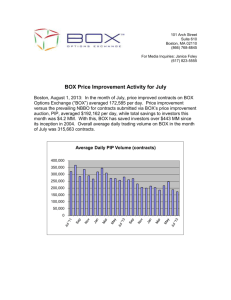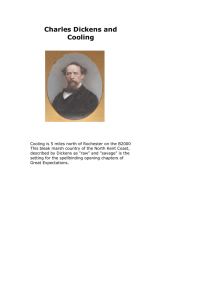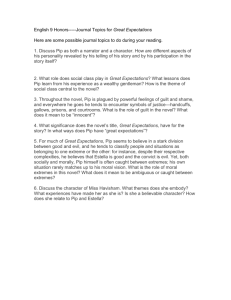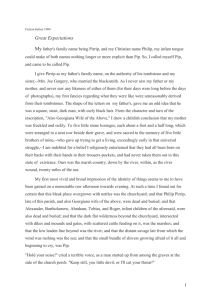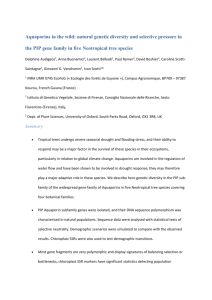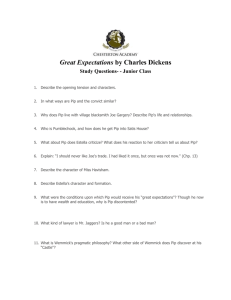Self Assessment Instructions
advertisement
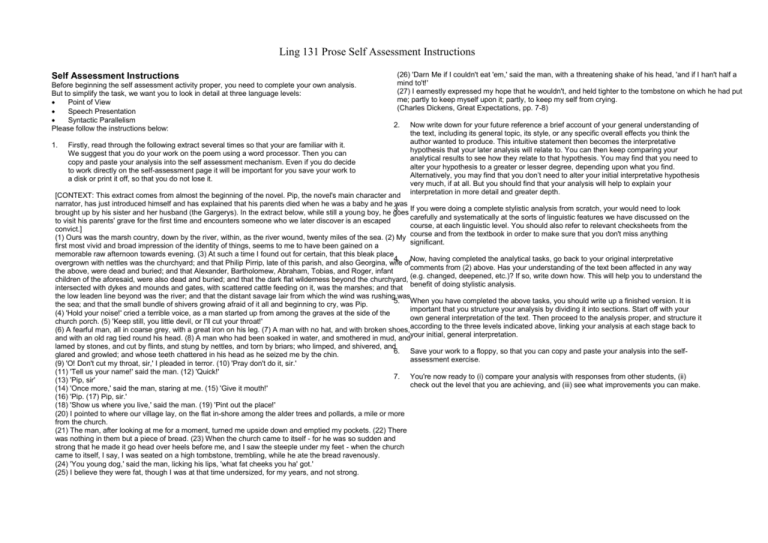
Ling 131 Prose Self Assessment Instructions Self Assessment Instructions Before beginning the self assessment activity proper, you need to complete your own analysis. But to simplify the task, we want you to look in detail at three language levels: Point of View Speech Presentation Syntactic Parallelism Please follow the instructions below: 1. Firstly, read through the following extract several times so that your are familiar with it. We suggest that you do your work on the poem using a word processor. Then you can copy and paste your analysis into the self assessment mechanism. Even if you do decide to work directly on the self-assessment page it will be important for you save your work to a disk or print it off, so that you do not lose it. (26) 'Darn Me if I couldn't eat 'em,' said the man, with a threatening shake of his head, 'and if I han't half a mind to't!' (27) I earnestly expressed my hope that he wouldn't, and held tighter to the tombstone on which he had put me; partly to keep myself upon it; partly, to keep my self from crying. (Charles Dickens, Great Expectations, pp. 7-8) 2. Now write down for your future reference a brief account of your general understanding of the text, including its general topic, its style, or any specific overall effects you think the author wanted to produce. This intuitive statement then becomes the interpretative hypothesis that your later analysis will relate to. You can then keep comparing your analytical results to see how they relate to that hypothesis. You may find that you need to alter your hypothesis to a greater or lesser degree, depending upon what you find. Alternatively, you may find that you don’t need to alter your initial interpretative hypothesis very much, if at all. But you should find that your analysis will help to explain your interpretation in more detail and greater depth. [CONTEXT: This extract comes from almost the beginning of the novel. Pip, the novel's main character and narrator, has just introduced himself and has explained that his parents died when he was a baby and he was 3. If you were doing a complete stylistic analysis from scratch, your would need to look brought up by his sister and her husband (the Gargerys). In the extract below, while still a young boy, he goes carefully and systematically at the sorts of linguistic features we have discussed on the to visit his parents' grave for the first time and encounters someone who we later discover is an escaped course, at each linguistic level. You should also refer to relevant checksheets from the convict.] (1) Ours was the marsh country, down by the river, within, as the river wound, twenty miles of the sea. (2) My course and from the textbook in order to make sure that you don't miss anything significant. first most vivid and broad impression of the identity of things, seems to me to have been gained on a memorable raw afternoon towards evening. (3) At such a time I found out for certain, that this bleak place 4. ofNow, having completed the analytical tasks, go back to your original interpretative overgrown with nettles was the churchyard; and that Philip Pirrip, late of this parish, and also Georgina, wife comments from (2) above. Has your understanding of the text been affected in any way the above, were dead and buried; and that Alexander, Bartholomew, Abraham, Tobias, and Roger, infant children of the aforesaid, were also dead and buried; and that the dark flat wilderness beyond the churchyard, (e.g. changed, deepened, etc.)? If so, write down how. This will help you to understand the intersected with dykes and mounds and gates, with scattered cattle feeding on it, was the marshes; and that benefit of doing stylistic analysis. the low leaden line beyond was the river; and that the distant savage lair from which the wind was rushing was 5. When you have completed the above tasks, you should write up a finished version. It is the sea; and that the small bundle of shivers growing afraid of it all and beginning to cry, was Pip. important that you structure your analysis by dividing it into sections. Start off with your (4) 'Hold your noise!' cried a terrible voice, as a man started up from among the graves at the side of the own general interpretation of the text. Then proceed to the analysis proper, and structure it church porch. (5) 'Keep still, you little devil, or I'll cut your throat!' (6) A fearful man, all in coarse grey, with a great iron on his leg. (7) A man with no hat, and with broken shoes,according to the three levels indicated above, linking your analysis at each stage back to and with an old rag tied round his head. (8) A man who had been soaked in water, and smothered in mud, andyour initial, general interpretation. lamed by stones, and cut by flints, and stung by nettles, and torn by briars; who limped, and shivered, and 6. Save your work to a floppy, so that you can copy and paste your analysis into the selfglared and growled; and whose teeth chattered in his head as he seized me by the chin. assessment exercise. (9) 'O! Don't cut my throat, sir,' I pleaded in terror. (10) 'Pray don't do it, sir.' (11) 'Tell us your name!' said the man. (12) 'Quick!' 7. You're now ready to (i) compare your analysis with responses from other students, (ii) (13) 'Pip, sir' check out the level that you are achieving, and (iii) see what improvements you can make. (14) 'Once more,' said the man, staring at me. (15) 'Give it mouth!' (16) 'Pip. (17) Pip, sir.' (18) 'Show us where you live,' said the man. (19) 'Pint out the place!' (20) I pointed to where our village lay, on the flat in-shore among the alder trees and pollards, a mile or more from the church. (21) The man, after looking at me for a moment, turned me upside down and emptied my pockets. (22) There was nothing in them but a piece of bread. (23) When the church came to itself - for he was so sudden and strong that he made it go head over heels before me, and I saw the steeple under my feet - when the church came to itself, I say, I was seated on a high tombstone, trembling, while he ate the bread ravenously. (24) 'You young dog,' said the man, licking his lips, 'what fat cheeks you ha' got.' (25) I believe they were fat, though I was at that time undersized, for my years, and not strong.
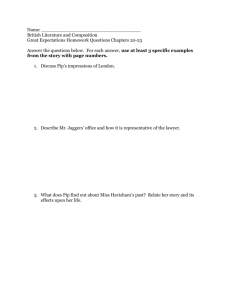
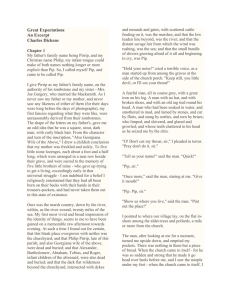
![GREAT EXPECTATIONS [1867 Edition] by Charles Dickens Chapter I](http://s2.studylib.net/store/data/017958877_1-fe7d135342ae7faca173ef632362e6a4-300x300.png)
